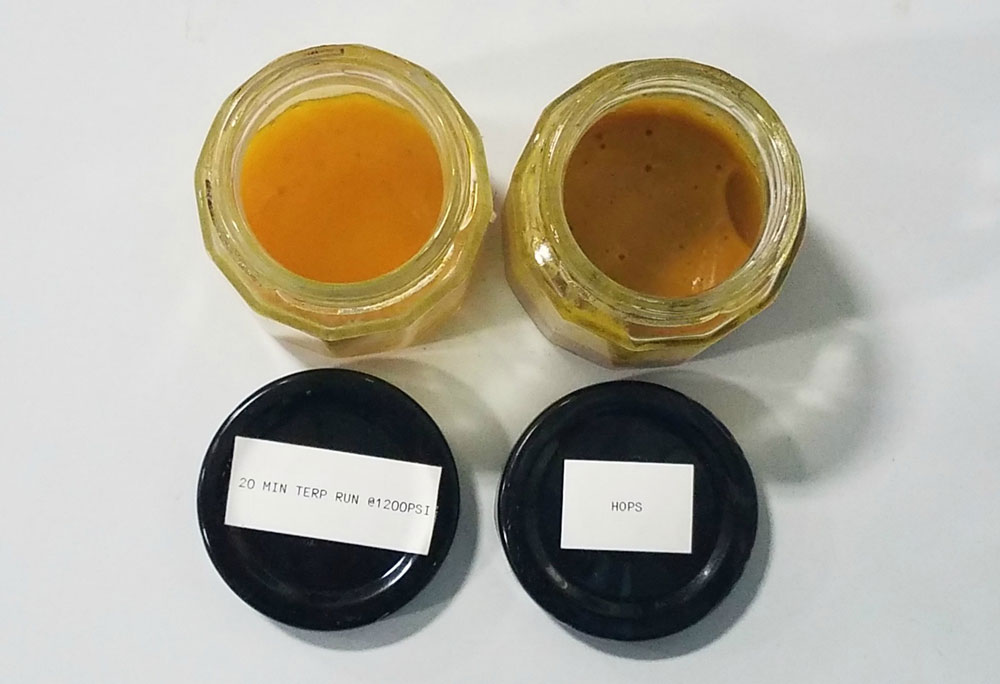Marijuana Terpene Extraction with Apeks Supercritical.
What is a Terpene?
Terpenes are compounds in botanical materials that give the plant its smell. In marijuana, each strain of the cannabis plant smells different because of the various aromatic terpenes.
Aromas and tastes are associated with the following cannabis terpenes:
limonene: sweet, orange, citrus
myrcene: herbal, woody, rose, celery, carrot
beta– caryophyllene: spicy, peppery, clove, dry woody, camphoreous, citrus
alpha-pinene: woody, pine, camphoreous, herbal, spicy, tropical
beta-pinene: fresh, pine, woody, resinous, minty, camphoreous, spicy
linalool: sweet, rose, woody, dusty
terpinolene: sweet, fresh, pine, citrus, woody, lemon peel
Terpenes don’t just smell nice (or funky, depending on the strain) — they have medicinal benefits as well. In fact, terpenes are believed to be responsible for the subtle difference in effects among strains that possess similar amounts of cannabinoids. For example, the terpenes myrcene and beta-caryophyllene have anti-inflammatory properties and help with pain, while limonene (citrusy scent) has shown to have an anti-depressant effect.
Terpenes are very popular in both recreational adult-use and medical cannabis products so it’s important for processors to know how to properly extract them.


Subcritical on the left, supercritical on the right
How to Extract Terpenes
Apeks Supercritical CO2 extraction machines are ideal for extracting terpenes. The systems allow for simple fractional extraction and cold separation processes which protect plant oils by never exposing them to a temperature higher than the extraction temperatures. Other manufacturer extraction systems typically use high temperatures in the extraction and separation vessels with heaters or heated water to offset the CO2 expansion cooling. Higher temperatures, not only cause light terpene oils to evaporate, but also cause discoloration of the extracted oils (thermal degradation).
Terpene extractions are best achieved during a short, light run, set at subcritical parameters (low pressure/low temperature). The system processes for around 20 minutes, then the operator harvests the extract which is pure, light and golden, containing just the terpene profile of the plant. There are no plant waxes, fats, and lipids, so the oil can be used directly in a vape pen. Or, it can be saved and added to an extraction from a subsequent longer subcritical run or a supercritical extraction after post processing.
What happens after Terpene Extraction?
Once the terpenes have been extracted, customers move on to subcritical and supercritical extractions. These extractions pull the higher-molecular weight materials (like waxes, paraffins, lipids and resins) from the plant, allowing for a more complete extraction and higher yields. However, these non-desirable waxes, etc., will need to be removed via a process called winterization.
Download a price list today!
Post Processing: Winterization
If a processor or machine operator extracts everything out of the plant in a supercritical run, post processing is required to refine the oil by removing the unwanted fats, waxes, and lipids. A common process to remove the fatty substances is winterization.
Apeks offers all its customers a free two-hour, hands-on class demonstrating how to winterize oil. Classes are held at the Apeks Supercritical manufacturing facility in Johnstown, Ohio. Non-customers can attend as well for a fee.Steps to winterization: Mix the extract with 200-proof alcohol and put in a deep freezer for a minimum of 24-48 hours. When it’s ready, pour the mixture into a funnel through filter paper which collects and traps the thick waxes. Repeat several times until all the unwanted substances have been removed. Next, remove the alcohol by using gentle heat and a rotary evaporator. Because alcohol boils at a lower temperature than the oil, it boils off and is captured for reuse.
To review a video of the winterization class, click here:


Apeks winterization class in action
Post Processing: Short Path Distillation
Distillation happens after winterization and requires specialized equipment, which utilizes heat to separate the compounds. During this process, the oil is even further refined, to isolate the cannabinoids out of the extract. This process is also sometimes referred to as short path distillation. It should be noted that the quality of the the cannabis is important: the quality going in determines the percentage of cannabinoids coming out – if you have a high level of THC in your plant materials, you’ll get the same high level in the extracted oil.
Both winterization and short path distillation require specialized equipment and training. It’s not as simple as it sounds, but the benefits are huge!
Download a price list today!
COntact Us
Got questions? We have answers.
For more information about our Apeks Supercritical systems please fill out the contact form below and we will respond to you shortly.

